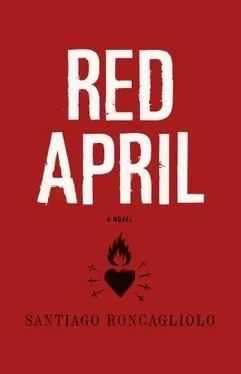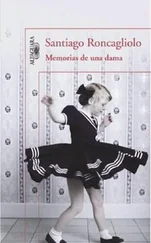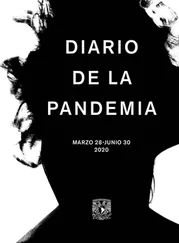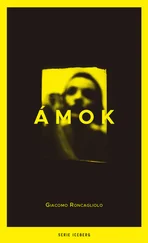“He died under his law.”
“He died under the only law there was, Señor Prosecutor, if there was any.”
“Why does it matter so much to you?”
The commander seemed to hesitate over what he would say. He looked at the bottle of pisco but did not get up. Then he said:
“At that time I was a captain. I was Cáceres's immediate superior. And according to the signals they're giving, the next victim … will be me.”
He tried to say the last sentence with self-assurance. A slight break in his voice betrayed his true state of mind. The prosecutor was moved to see this man confess that he was afraid. He felt better about his own fear. He said:
“Why don't you speak to the Intelligence Services?”
“Absolutely no contact with Lima, Chacaltana. Lima shouldn't know anything about this. During Holy Week, twenty thousand tourists will be in this city. It's the symbol of pacification. If they find out there's a recurrence, they'll cut off our balls. I don't want you to talk to anybody. Do you remember Carlos Martín Eléspuru?”
The prosecutor remembered the functionary Eléspuru. His ubiquity, his almost inaudible voice, his sky-blue tie. His serenity, his superiority.
“He shouldn't hear anything about this,” the commander continued. “And if we happen to run into him, you repeat everything I say: that terrorism is finished, that Peru waged a glorious struggle, any fucking stupid thing you can think of.”
“I do not understand, Commander. He should not hear anything about this?”
From one of his drawers, the commander took out a leather holster with a pistol inside. He placed it on the table, in front of the prosecutor. He recovered his authoritative tone to say:
“From now on you alone will take care of this investigation, Chacaltana. And fast. You'll deliver your reports directly to me and you'll have all my support, but I want you to find out once and for all what the fuck is going on and where so many terrorists are coming from. Carry this, you'll need it.”
“It will not be necessary, Se …”
“Carry it, damn it!”
The prosecutor picked up the holster by the barrel of the gun so the weapon would not go off. It was the first time he had held a weapon. It was very heavy for its size.
“Pick it up like a man, Chacaltana. Now leave. I have work to do.”
The prosecutor stood. He did not know if his appointment was an honor or a liability. He did not know whether to say thank you or request a transfer. There were many things he did not know. Mayta's was a long act of vengeance. It had taken ten years to arrive. From the door he turned to the commander to ask a final question:
“Commander, I need to know something. Edwin Mayta Carazo … was he innocent?”
“I don't know, Chacaltana. I don't think even he knew.”
It was afternoon when he left the commander's office and found himself in crowds of tourists waiting for the first processions of the day. He realized it was Friday of Sorrows. No one would be at the Office of the Prosecutor. He hurried to his own office and locked the door.
He put the holster on his desk. He looked at it. He did not want to take it to his house, so close to his mother. He thought about the mother of the Mayta family. Two sons lost at ten-year intervals. The bullets had reached her family from both sides of a battle that this woman surely never understood completely, just like the prosecutor. He opened the holster and took out the pistol with two fingers before putting it down again on the desk. It was black, 9mm, with a box of ammunition on the back of the sheath. The kind of weapon lieutenants use, like Cáceres, who had become intoxicated by the death of other people and in the end had left his job and run directly toward his own. Why?
It was difficult for him to take out the cartridge to verify that the weapon was loaded. It cost him even more effort to think what would happen if Sendero was rearming. He would not be enough to control it, or Commander Carrión, or all the functionaries in Lima. He closed the pistol carefully and put on the safety, or what he thought was the safety. If Sendero was regrouping, the best thing he could do with that pistol was blow his brains out.
But there were some very strange details in the latest deaths. Things he ought to investigate, which did not fit with traditional Senderista methods. His function now was to investigate on his own, to put his head where nobody wanted to put it, not even himself. Perhaps it was a promotion after all. That is what those famous ambitions brought one to.
He returned the pistol to the holster and put it under his jacket, between his armpit and his waist. He made certain it could not be seen. It felt strange and heavy. He took it off again and locked it in his drawer with two turns of the key. Before he closed the drawer, he took out the report and put it in an envelope to take to Carrión personally. When he walked without the weapon, he was filled with a sensation of peace and normality. He left the office at night, when he could begin to hear the procession of the Virgin of Sorrows.
The Magdalena district was packed with Limenians in sports clothes holding beers and cameras in their hands. The younger Ayacuchan girls approached the tourists calling them “amigo, amigo” and smiling at them. The older ones, the ones who had grown up shut in their houses during the war, looked at those brazen girls disapprovingly, though many mothers harbored the hope that some Limenian or, better yet, an American, would fall in love with one of their daughters and take her away from Ayacucho. It became difficult for the prosecutor to move forward. He was trapped by people, by the stands selling drinks, the smell of punch, the din. His mind wandered with the movement of bodies. Each person he bumped into seemed like a blow in his memory.
When he thought he had found a way through the crowd, an even larger surge of people blocked his way. Beside him the platform carrying St. John emerged; it had just left the church. He let himself be carried along, exhausted. The lights of the city and the fireworks gave him the impression of an overpopulated sky filled with souls circulating together toward some destination. At times the explosion of a firecracker startled him, but the sound was muffled by the mass of people. The prosecutor advanced with the procession until the moment he found most interesting: the encounter of the Lord of Agony and the Virgin of Sorrows, which symbolized the suffering of Christ and his Mother. When the platforms began to approach each other, the Associate District Prosecutor felt spurred on by a presentiment. Filled with tension, he tried to get closer, in among the men carrying the platforms, until he felt himself held back by his shirt. Somebody had sewn his sleeve to the sleeve of someone else. It was part of the celebration. The prosecutor freed himself violently, to the surprise of the other man, who laughed. He felt dizzy, perhaps because of the smell of the platforms and the people. He felt a jab. Beside him, several women were jabbing one another with needles and laughing, “to help the Lord in his pain.” He managed to move closer to the platform of the Virgin, who now was shining almost above him, like a true apparition of light, like a mother who materializes before her son, the Lord of Agony, the son who is going to die in his final farewell to life. He reached the edges of the platform and at last could see her clearly. The Virgin's black dress, the candles on the platform that illuminated her from below, her immaculate face, and the seven daggers that pierced her chest, as they pierced the chest of Justino Mayta Carazo, the son of the mother who searched mass graves.
The prosecutor tried to kneel before the holy image, but the movement of the people was too dense. He tried to move away, avoiding the jabs like daggers waiting in ambush. With the seven stab wounds piercing his mind, he tried to move away from the center of the procession. He looked up when he calculated he was in front of Edith's restaurant. Shoving his way through the crowd, he reached the door. Edith looked at him from the counter. She smiled, showing her brilliant teeth. Associate District Prosecutor Félix Chacaltana Saldívar got around the last human obstacles to reaching her, went into the restaurant, rushed to her and embraced her, very closely, surrounded by people who for the first time filled the restaurant. Some tourists applauded, others smiled, like the startled Edith herself, but he did not stop embracing her. He clung to that small body, that smell of the kitchen, with his eyes closed, as if it were the last time.
Читать дальше












